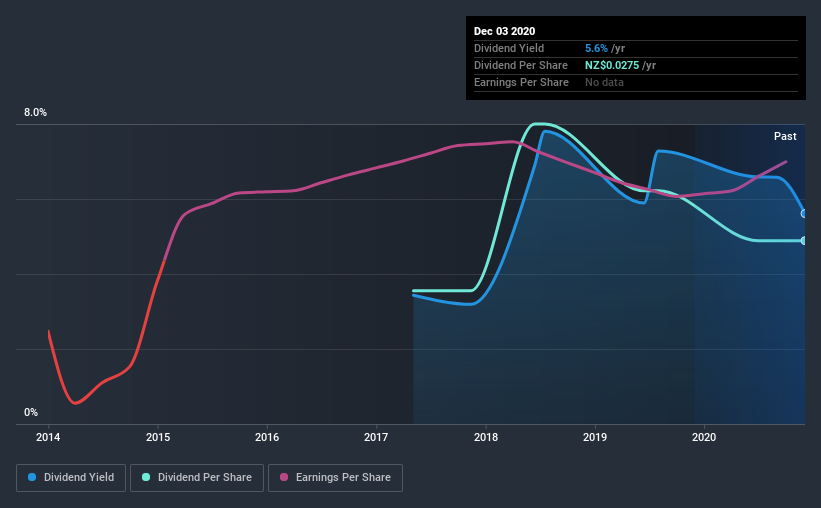- New Zealand
- /
- Consumer Finance
- /
- NZSE:GFL
What Makes Geneva Finance Limited (NZSE:GFL) A Great Dividend Stock?

Dividend paying stocks like Geneva Finance Limited (NZSE:GFL) tend to be popular with investors, and for good reason - some research suggests a significant amount of all stock market returns come from reinvested dividends. Yet sometimes, investors buy a stock for its dividend and lose money because the share price falls by more than they earned in dividend payments.
In this case, Geneva Finance likely looks attractive to dividend investors, given its 5.6% dividend yield and four-year payment history. We'd agree the yield does look enticing. Some simple analysis can offer a lot of insights when buying a company for its dividend, and we'll go through this below.
Explore this interactive chart for our latest analysis on Geneva Finance!

Payout ratios
Companies (usually) pay dividends out of their earnings. If a company is paying more than it earns, the dividend might have to be cut. So we need to form a view on if a company's dividend is sustainable, relative to its net profit after tax. In the last year, Geneva Finance paid out 38% of its profit as dividends. This is a middling range that strikes a nice balance between paying dividends to shareholders, and retaining enough earnings to invest in future growth. Besides, if reinvestment opportunities dry up, the company has room to increase the dividend.
Remember, you can always get a snapshot of Geneva Finance's latest financial position, by checking our visualisation of its financial health.
Dividend Volatility
From the perspective of an income investor who wants to earn dividends for many years, there is not much point buying a stock if its dividend is regularly cut or is not reliable. Geneva Finance has been paying a dividend for the past four years. It has only been paying dividends for a few short years, and the dividend has already been cut at least once. This is one income stream we're not ready to live on. During the past four-year period, the first annual payment was NZ$0.02 in 2016, compared to NZ$0.03 last year. This works out to be a compound annual growth rate (CAGR) of approximately 8.3% a year over that time. Geneva Finance's dividend payments have fluctuated, so it hasn't grown 8.3% every year, but the CAGR is a useful rule of thumb for approximating the historical growth.
It's good to see the dividend growing at a decent rate, but the dividend has been cut at least once in the past. Geneva Finance might have put its house in order since then, but we remain cautious.
Dividend Growth Potential
With a relatively unstable dividend, it's even more important to see if earnings per share (EPS) are growing. Why take the risk of a dividend getting cut, unless there's a good chance of bigger dividends in future? It's good to see Geneva Finance has been growing its earnings per share at 17% a year over the past five years. A company paying out less than a quarter of its earnings as dividends, and growing earnings at more than 10% per annum, looks to be right in the cusp of its growth phase. At the right price, we might be interested.
Conclusion
To summarise, shareholders should always check that Geneva Finance's dividends are affordable, that its dividend payments are relatively stable, and that it has decent prospects for growing its earnings and dividend. We're glad to see Geneva Finance has a low payout ratio, as this suggests earnings are being reinvested in the business. Next, earnings growth has been good, but unfortunately the dividend has been cut at least once in the past. Overall we think Geneva Finance is an interesting dividend stock, although it could be better.
It's important to note that companies having a consistent dividend policy will generate greater investor confidence than those having an erratic one. At the same time, there are other factors our readers should be conscious of before pouring capital into a stock. To that end, Geneva Finance has 3 warning signs (and 1 which is a bit concerning) we think you should know about.
We have also put together a list of global stocks with a market capitalisation above $1bn and yielding more 3%.
If you’re looking to trade Geneva Finance, open an account with the lowest-cost* platform trusted by professionals, Interactive Brokers. Their clients from over 200 countries and territories trade stocks, options, futures, forex, bonds and funds worldwide from a single integrated account. Promoted
If you're looking to trade Geneva Finance, open an account with the lowest-cost platform trusted by professionals, Interactive Brokers.
With clients in over 200 countries and territories, and access to 160 markets, IBKR lets you trade stocks, options, futures, forex, bonds and funds from a single integrated account.
Enjoy no hidden fees, no account minimums, and FX conversion rates as low as 0.03%, far better than what most brokers offer.
Sponsored ContentNew: Manage All Your Stock Portfolios in One Place
We've created the ultimate portfolio companion for stock investors, and it's free.
• Connect an unlimited number of Portfolios and see your total in one currency
• Be alerted to new Warning Signs or Risks via email or mobile
• Track the Fair Value of your stocks
This article by Simply Wall St is general in nature. It does not constitute a recommendation to buy or sell any stock, and does not take account of your objectives, or your financial situation. We aim to bring you long-term focused analysis driven by fundamental data. Note that our analysis may not factor in the latest price-sensitive company announcements or qualitative material. Simply Wall St has no position in any stocks mentioned.
*Interactive Brokers Rated Lowest Cost Broker by StockBrokers.com Annual Online Review 2020
Have feedback on this article? Concerned about the content? Get in touch with us directly. Alternatively, email editorial-team@simplywallst.com.
About NZSE:GFL
Geneva Finance
Geneva Finance Limited lends money to individuals, companies, and other entities primarily in New Zealand and Tonga.
Medium and good value.
Market Insights
Community Narratives




